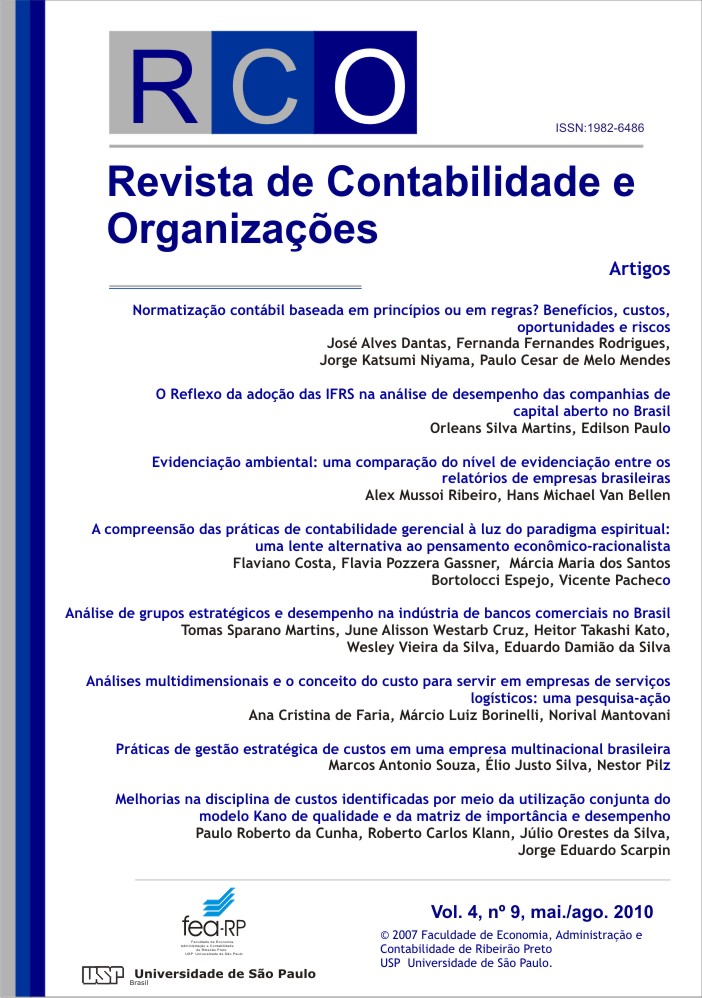Evidenciação ambiental: uma comparação do nível de evidenciação entre os relatórios de empresas brasileiras
DOI:
https://doi.org/10.11606/rco.v4i9.34767Palavras-chave:
Evidenciação Ambiental, Contabilidade Ambiental, Relatórios Ambientais, Informações AmbientaisResumo
Com o agravamento da crise ambiental e a ascensão do mercado "verde", a informação ambiental passou a ocupar um lugar de destaque na mídia coorporativa. Gray e Bebbington (2001) afirmam que a performance ambiental refletida nos relatórios empresariais passou a ser um direcionador de investimentos e as empresas que falharem em identificar isso serão penalizadas de maneira econômica e social. Tendo em vista o rumo crescente da evidenciação de informações ambientais, o objetivo principal deste trabalho é identificar em três tipos diferentes de relatórios empresariais, o relatório anual (RA), o formulário 20F (20F) e o relatório sócio-ambiental (RSA), quais os tipos de informações ambientais apresentam maior evidenciação, em que nível cada relatório as divulga e qual é o relatório preferido de cada empresa para mostrar suas informações ambientais. O método utilizado foi, predominantemente, quantitativo de cunho descritivo. A amostra selecionada foi de empresas brasileiras que negociam papéis nos mercados brasileiro e dos Estados Unidos. A classificação escolhida para os dados foi adaptada dos trabalhos de Clarkson et al (2008) e Wiseman (1982), com ênfase nos preceitos do Global Reporting Initiative (GRI). Os resultados encontrados comprovam que existem diferenças significativas na quantidade e na qualidade das informações ambientais evidenciadas em cada tipo de relatório. O relatório mais completo e com informações mais relevantes é o relatório sócio-ambiental, entretanto, em termos absolutos, o relatório anual é o canal mais utilizado pelas empresas da amostra para divulgar suas informações ambientais e os formulários 20F se destacam na divulgação de informações sobre riscos e litígios ambientais.Downloads
Publicado
Edição
Seção
Licença
A RCO adota a política de Acesso Livre (Libre Open Access), sob o acordo padrão Creative Commons (CC BY-NC-ND 4.0). O acordo prevê que:
- A submissão de texto autoriza sua publicação e implica compromisso de que o mesmo material não esteja sendo submetido a outro periódico. O original é considerado definitivo;
- Autores mantêm os direitos autorais e concedem à revista o direito de primeira publicação, com o trabalho simultaneamente licenciado sob a Licença Creative Commons Attributionque permite o compartilhamento do trabalho com reconhecimento da autoria e publicação inicial nesta revista;
- Autores têm autorização para assumir contratos adicionais separadamente, para distribuição não-exclusiva da versão do trabalho publicada nesta revista (ex.: publicar em repositório institucional ou como capítulo de livro), com necessário reconhecimento de autoria e publicação inicial nesta revista;
- Autores têm permissão e são estimulados a publicar e distribuir seu trabalho online (ex.: em repositórios institucionais ou na sua página pessoal) antes ou durante o processo editorial, já que isso pode gerar alterações produtivas, bem como aumentar o impacto e a citação do trabalho publicado (Veja O Efeito do Acesso Livre);
- A revista não paga direitos autorais aos autores dos textos publicados;
- O detentor dos direitos autorais da revista, exceto os já acordados no acordo de Libre Open Access (CC BY-NC-ND 4.0), é o Departamento de Contabilidade da Faculdade de Economia, Administração e Contabilidade de Ribeirão Preto da Universidade de São Paulo.
Não são cobradas taxas de submissão ou de publicação.
São aceitos até 4 autores por artigo. Casos excepcionais devidamente justificados poderão ser analisados pelo Comitê Executivo da RCO. São considerados casos excepcionais: projetos multi-institucionais; manuscritos resultantes da colaboração de grupos de pesquisa; ou que envolvam grandes equipes para coleta de evidências, construção de dados primários e experimentos comparados.
É recomendada a ordem de autoria por contribuição, de cada um dos indivíduos listados como autores, especialmente no desenho e planejamento do projeto de pesquisa, na obtenção ou análise e interpretação de dados e redação. Os autores devem declarar as efetivas contribuições de cada autor, preenchendo a carta ao editor, logo no início da submissão, responsabilizando-se pelas informações dadas.
É permitida a troca de autores durante todo o processo de avaliação e, antes da publicação do manuscrito. Os autores devem indicar a composição e ordem final de autoria no documento assinado por todos os envolvidos no aceite para publicação. Caso a composição e ordem de autoria seja diferente da informada anteriormente no sistema, todos autores anteriormente listados deverão se manifestar favoráveis.
No caso de identificação de autoria sem mérito ou contribuição (ghost, guest or gift authorship), a RCO segue o procedimento recomendado pela COPE.








